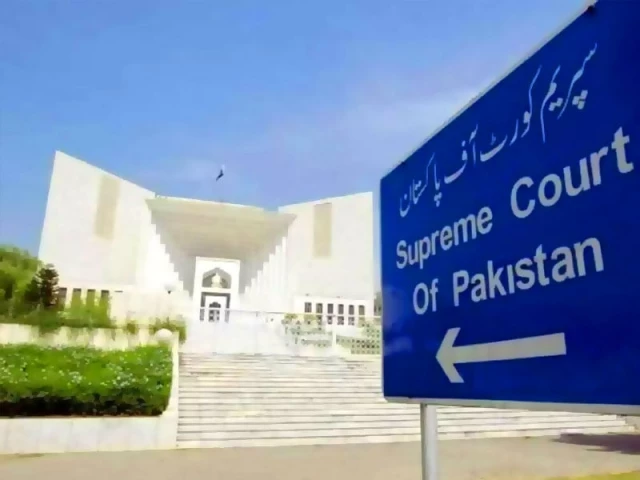Islamabad:
On Thursday, the Supreme Court held a discussion on the composition of the bench competently to hear petitions against the 26th constitutional amendment, as a lawyer for the petitioners called for the case to be referred to a bench consisting of all 16 SC judges who formed the full court before the change.
On Thursday, an eight-member constitutional bench (CB) from the Supreme Court heard by Justice Amin-Ud-Din Khan the petitions against the 26th constitutional amendment, which resulted in sweeping changes in the judiciary, including the formation of CBS in SC and high courts.
During the hearing, senior lawyer Munir a Malik representing Balochistan wore Council and Balochistan High Court Bar that he adopted the arguments presented by lawyer Hamid Khan, but also wanted to make some further submissions.
When Justice Jamal Khan Mandokhail noticed that Hamid Khan did not argue for the current full court, but to a 16-member bench, Malik replied that his attitude was the same. “The case was to be heard by the full court when it existed before the amendment,” he said.
Justice Mandokhail noted that such a bench would not be a full court but a larger bench.
Malik said he would read Article 191-A of the Constitution.
He said that the 26th change does not say that the Supreme Court only exerts its powers through a CB. CB is part of the Supreme Court itself – it is not a separate unit.
“The definition of the Supreme Court is found in Article 176 of the Constitution, which states that the Supreme Court consists of Chief Justice and all the judges. My submission is that this case must be heard by the Supreme Court as a whole.”
Justice Mandokhail asked if a bench that includes all judges would not still be called a bench. Munir Malik answered negatively and said it would be called the Supreme Court in Banc – Full Court – which, he said, is a universally recognized practice.
Justice Ayesha Malik noted that there is a convention related to this and no court decision prevents the formation of a full court. Justice Muhammad Ali Mazhar asked if CB issued such an order to whom it would be processed.
Malik replied that such an order would apply to all authorities under the Constitution. Justice Mandokhail asked if the bench issued such an order, the full court would be called a CB.
Malik said his submission is that Article 191-A did not change the Supreme Court’s definition or powers. A full court that acts as the Supreme Court can hear this case.
“The powers of the Supreme Court can only be removed by abolishing the court itself. Article 176 remains unchanged in the Constitution. A full court must be referred to as the Supreme Court – the term bench is foreign to the Constitution.”
Justice Mandokhail observed that the 26th change did not actually restrict the Supreme Court’s jurisdiction. “However, the Legal Commission for Pakistan (JCP) may form a constitutional bench consisting of all judges,” he said.
Justice Amin-out-Din Khan asked if CB should ignore Article 191-A and adopt an order.
Justice Ayesha Malik said Article 191-A does not remove SC’s judicial powers. “That in itself is under challenge in front of us. Why should we move forward by approving it first?”
Justice Muhammad Ali Mazhar asked what was the reason for the existing bench if Article 191-A was to be disregarded. Justice Amin-out-Din Khan pointed out that the very bench was composed of a committee set up through the 26th amendment.
Malik replied that his submission was simple – that nothing prevented the bench from issuing a court decision.
During the consultation, an exchange of comments took place among the judges.
Justice Musarrat Hilali noted that the bench must return to Point Zero and investigate whether the changes that followed violated fundamental rights. “The judges appointed after the 26th change cannot hear this case,” she added.
However, Justice Mandokhail disagreed with the point of view and asked if the new judge who was appointed after the amendment was imported from another country.
Justice Mazhar noted that the appointment of judges to the Supreme Court had no connection with the amendment. “The number of Supreme Court judges was increased through the law, not through the 26th change,” he said.
Justice Ayesha Malik said, however, that these judges were appointed to the Supreme Court according to the procedure laid down during the 26th amendment.
In response to Malik’s claim that only the judges who were part of the Supreme Court before the 26th change had to hear the case, Justice Mandokhail asked how CB could exclude Brordomers.
Justice Hilali noted that the fate of the judges, who were appointed after the 26th constitutional amendment, hanging on the outcome of the case. “Whether they remain SC -judges or not, it will be known when the verdict is announced,” she said.
Justice Mandokhail asked where the judge would go if the court set aside the amendment. Malik replied that the judge would return to their respective high courts.
Later, the court postponed the hearing until Monday.



